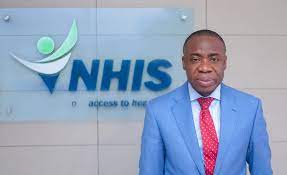The Chief Executive Officer of the National Health Insurance Authority (NHIA), Dr Aboagye Dacosta has raised alarm about the increasing rate of Non-Communicable Diseases (NCDs) in Ghana describing them as the next pandemic.
He emphasised that immediate and proactive measures are essential to prevent these diseases from becoming widespread and causing severe health and economic impacts.
He asserted that people need to take this concern seriously and tackle it from the root causes.
In an interview with Joy FM’s Super Morning Show on Monday after the airing of JoyNews' latest hotline documentary titled, "NCDs - The Silent Epidemic", Dr Dacosta highlighted the urgency of addressing NCDs from their root, saying “Prevention is crucial for healthy living".
“I believe that NCDs are the next pandemic."
“From the NHIS point of view, we believe that for our 20-year history, it has been curative, so you wait for people to be sick before they go to the hospital that is not right, so the new reforms coming in won’t be focusing on preventive health care using the biomedical approach.”
“So we will be introducing what we call the annual health check to detect these NCDs at the early stage.”
A key component of these reforms is the introduction of annual health checks to detect NCDs early. “This initiative will help increase life expectancy, reduce the financial burden on the NHIS, and contribute to achieving the Sustainable Development Goals, particularly Goal 3, which promotes wellness,” Dr Dacosta explained.
Drawing from his experience in the Ghana Health Service, Dr Dacosta noted that wellness clinics play a vital role in preventive healthcare.
"All health facilities are now required to have wellness clinics where individuals can check their vitals and receive counselling on nutrition and lifestyle. Although the programme hasn’t started yet, we plan to send text messages to individuals on their birthdays, reminding them to visit the nearest health facility for essential checks such as blood sugar, blood pressure, and weight.”
Addressing the significant drivers of NCDs, Dr Dacosta pointed out that hypertension and diabetes are major concerns.
“In going forward, we will try and also add other labs in terms of HPV and the others so we want to start from somewhere so that we learn from it and continue with it.”
Furthermore, Dr Dacosta stressed the importance of preventive approaches to kidney disease, “So the dialysis we talk about is at the end stage, so it is time for us to take or come to the basis and say that, no, let's address this head-on, right from the preventive aspect then we will see that, initially the cost may go high as we do that, but you will see that cost burden will reduce overtime, so this is the NHIS approach in terms of how to deal with it.
Latest Stories
-
Inter edge out Bayern to reach Champions League semis
42 minutes -
Superb Arsenal defeat Real Madrid to reach semi-finals
46 minutes -
GPL 2024/25: Young Apostles’ late goals seal win over Berekum Chelsea
51 minutes -
FIFA Club World Cup arrives in Casablanca for final African stop
55 minutes -
Level 100 student allegedly commits suicide after partner cheats on him
3 hours -
Tariffs will hit US economy and raise prices, says Fed boss
3 hours -
Muster courage and go by dictates of report – Dr Asah-Asante to NPP
5 hours -
Minority urges Mahama to act on Bawku security situation
5 hours -
Olive Tower Prayer Ministries, Unilever Ghana hold free health screening for 700 Pokuase M.A. Basic School students
5 hours -
Obama calls Trump’s freeze of Harvard funding ‘unlawful’
6 hours -
Albert Kobina Mensah: Observed or discovered?
6 hours -
US tariffs will make global trade shrink, says WTO
6 hours -
UK bans EU cheese and meat imports to prevent disease spreading
6 hours -
NPP to begin nationwide Thank You Tour after 2024 election defeat
6 hours -
GPL 24/25: Aduana Stars defeat spiritless Hearts of Oak
6 hours

